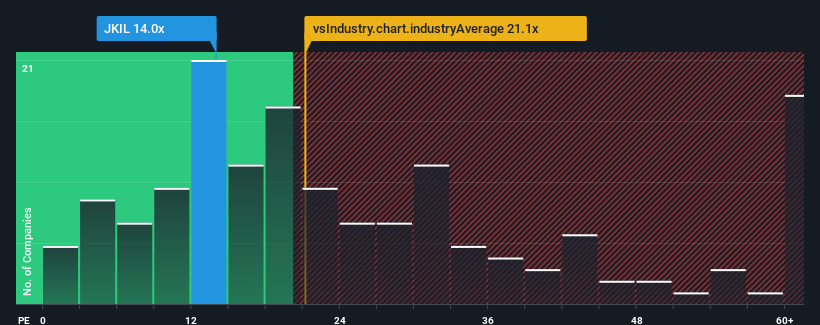- India
- /
- Construction
- /
- NSEI:JKIL
A Piece Of The Puzzle Missing From J. Kumar Infraprojects Limited's (NSE:JKIL) Share Price
J. Kumar Infraprojects Limited's (NSE:JKIL) price-to-earnings (or "P/E") ratio of 14x might make it look like a buy right now compared to the market in India, where around half of the companies have P/E ratios above 27x and even P/E's above 52x are quite common. However, the P/E might be low for a reason and it requires further investigation to determine if it's justified.
Recent times have been advantageous for J. Kumar Infraprojects as its earnings have been rising faster than most other companies. One possibility is that the P/E is low because investors think this strong earnings performance might be less impressive moving forward. If you like the company, you'd be hoping this isn't the case so that you could potentially pick up some stock while it's out of favour.
See our latest analysis for J. Kumar Infraprojects

What Are Growth Metrics Telling Us About The Low P/E?
In order to justify its P/E ratio, J. Kumar Infraprojects would need to produce sluggish growth that's trailing the market.
Retrospectively, the last year delivered an exceptional 25% gain to the company's bottom line. The latest three year period has also seen an excellent 130% overall rise in EPS, aided by its short-term performance. Accordingly, shareholders would have probably welcomed those medium-term rates of earnings growth.
Shifting to the future, estimates from the four analysts covering the company suggest earnings should grow by 26% over the next year. With the market predicted to deliver 24% growth , the company is positioned for a comparable earnings result.
With this information, we find it odd that J. Kumar Infraprojects is trading at a P/E lower than the market. It may be that most investors are not convinced the company can achieve future growth expectations.
The Final Word
Typically, we'd caution against reading too much into price-to-earnings ratios when settling on investment decisions, though it can reveal plenty about what other market participants think about the company.
Our examination of J. Kumar Infraprojects' analyst forecasts revealed that its market-matching earnings outlook isn't contributing to its P/E as much as we would have predicted. When we see an average earnings outlook with market-like growth, we assume potential risks are what might be placing pressure on the P/E ratio. It appears some are indeed anticipating earnings instability, because these conditions should normally provide more support to the share price.
And what about other risks? Every company has them, and we've spotted 1 warning sign for J. Kumar Infraprojects you should know about.
You might be able to find a better investment than J. Kumar Infraprojects. If you want a selection of possible candidates, check out this free list of interesting companies that trade on a low P/E (but have proven they can grow earnings).
New: Manage All Your Stock Portfolios in One Place
We've created the ultimate portfolio companion for stock investors, and it's free.
• Connect an unlimited number of Portfolios and see your total in one currency
• Be alerted to new Warning Signs or Risks via email or mobile
• Track the Fair Value of your stocks
Have feedback on this article? Concerned about the content? Get in touch with us directly. Alternatively, email editorial-team (at) simplywallst.com.
This article by Simply Wall St is general in nature. We provide commentary based on historical data and analyst forecasts only using an unbiased methodology and our articles are not intended to be financial advice. It does not constitute a recommendation to buy or sell any stock, and does not take account of your objectives, or your financial situation. We aim to bring you long-term focused analysis driven by fundamental data. Note that our analysis may not factor in the latest price-sensitive company announcements or qualitative material. Simply Wall St has no position in any stocks mentioned.
About NSEI:JKIL
Flawless balance sheet, good value and pays a dividend.
Similar Companies
Market Insights
Community Narratives


Recently Updated Narratives

Early mover in a fast growing industry. Likely to experience share price volatility as they scale


Near zero debt, Japan centric focus provides future growth

TAV Havalimanlari Holding will fly high with 25.68% revenue growth
Popular Narratives


MicroVision will explode future revenue by 380.37% with a vision towards success


The company that turned a verb into a global necessity and basically runs the modern internet, digital ads, smartphones, maps, and AI.



